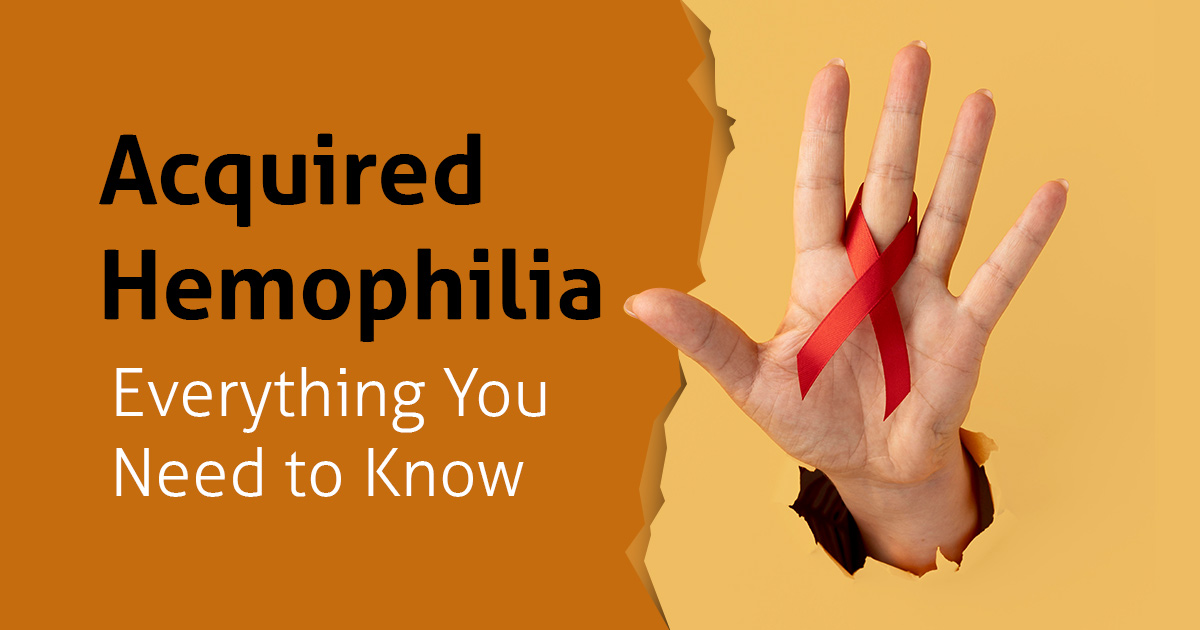Acquired Hemophilia: Symptoms & Available Treatment Options

Acquired hemophilia is an uncommon bleeding disorder that occurs when the immune system mistakenly targets and destroys clotting factor VIII, disrupting normal blood clotting. This prevents normal blood clotting, leading to excessive or spontaneous bleeding. Unlike hereditary hemophilia, which is inherited and primarily affects males, acquired hemophilia can occur in both men and women later in life. It often results from underlying health conditions, medications, or unknown causes. Timely detection and appropriate care play a crucial role in reducing the risk of serious complications.
Symptoms and Warning Signs
Bleeding caused by acquired hemophilia can occur spontaneously or after medical procedures. The severity depends on how much clotting factor is inhibited by the immune system.
Common Symptoms
People with acquired hemophilia may experience:
- Unexplained bruising beneath the skin
- Frequent nosebleeds
- Blood in urine or stool
- Prolonged bleeding after vaccinations or minor injuries
- Bleeding in muscles and joints, causing pain and swelling
- Severe internal bleeding, particularly in the digestive and urinary systems
Bleeding in the brain is among the most severe and life-threatening complications. Symptoms include persistent headaches, vision problems, dizziness, and seizures. Any of these warning signs require immediate medical attention.
Acquired Hemophilia Causes and Risk Factors
In nearly half of all cases, the exact cause of acquired hemophilia is unclear. The rest are linked to conditions that disrupt the immune system, causing it to attack clotting proteins.
Underlying Health Conditions
Autoimmune disorders, such as lupus, multiple sclerosis, and rheumatoid arthritis, increase the risk of developing acquired hemophilia. The immune system wrongly targets clotting factors as threats, disrupting blood clotting and causing uncontrolled bleeding.
Chronic diseases, including diabetes, inflammatory bowel disease, and hepatitis, may also contribute to acquired hemophilia by triggering immune system responses that interfere with blood clotting.
Pregnancy and Cancer-Related Causes
Acquired hemophilia can develop during pregnancy or after childbirth due to immune system changes. In most cases, pregnancy-related acquired hemophilia resolves on its own, but medical treatment may still be required.
Certain types of cancer, particularly blood cancers and tumors, can cause acquired hemophilia by affecting the immune system’s ability to regulate clotting factors.
Medications and Infections
Some medications, including antibiotics like penicillin and interferon, have been linked to acquired hemophilia. These drugs can cause an immune response that targets clotting factors.
Infections can stimulate inflammation and over-activate the immune system, potentially leading to acquired hemophilia, though not everyone exposed to these triggers develops the condition.
Diagnosis and Testing
Diagnosing acquired hemophilia requires a thorough evaluation since symptoms may resemble other bleeding disorders. Doctors typically perform blood tests to assess clotting factor levels and detect any antibodies interfering with blood clotting.
Blood Tests and Laboratory Analysis
A doctor may first check clotting times using routine blood tests. If results suggest abnormal clotting, additional specialized tests measure specific clotting factor levels. A test to detect clotting factor inhibitors helps confirm an acquired hemophilia diagnosis.
Since this condition is rare, misdiagnosis can happen. Individuals experiencing unusual bruising or prolonged bleeding should consult a doctor for a thorough evaluation and appropriate care.
Acquired Hemophilia Treatment Options
Treatment focuses on controlling bleeding, eliminating antibodies attacking clotting factors, and managing underlying health conditions. Treatment varies based on symptom severity and any underlying health conditions.
Controlling Bleeding Episodes
Doctors use anti-hemorrhagic medications, such as bypassing agents, to help the blood clot when bleeding occurs. These medications work by bypassing the blocked clotting factor and allowing clots to form.
Patients experiencing severe bleeding may require hospital treatment. Prompt medical attention is necessary to prevent complications, especially when bleeding occurs in critical areas like the brain or internal organs.
Suppressing the Immune Response
Since acquired hemophilia is an autoimmune condition, doctors often use immunosuppressive therapy to reduce the production of harmful antibodies. Doctors often prescribe corticosteroids to reduce immune system activity and prevent further damage.
In some cases, additional immunosuppressive drugs are necessary if initial treatment does not effectively reduce antibody levels. Treatment plans are tailored to each patient based on their overall health and response to therapy.
Managing Underlying Conditions
If acquired hemophilia is linked to another medical condition, addressing that issue may improve symptoms. For example, treating an autoimmune disease or adjusting medication use can help reduce antibody production and restore normal clotting function.
Acquired Hemophilia Life Expectancy and Outlook
The outlook for acquired hemophilia depends on bleeding severity, treatment timing, and the patient’s overall health condition.
Risk of Severe Bleeding
Research suggests that around 70% of patients with acquired hemophilia experience severe bleeding at some point. Without proper treatment, excessive bleeding can be life-threatening. However, survival rates improve when patients receive appropriate medical care.
Delayed diagnosis or inadequate treatment increases the risk of complications. People who develop acquired hemophilia due to underlying conditions may have a more complex outlook, as additional health factors influence recovery.
Long-Term Management and Recovery
For many patients, acquired hemophilia resolves with proper treatment. Some individuals recover completely after immune-suppressing therapy, while others require ongoing monitoring to prevent relapses. Those with persistent cases may need long-term management to control symptoms and prevent severe bleeding.
Moving Forward with the Right Care
Acquired hemophilia is an uncommon yet serious disorder that demands prompt diagnosis and appropriate treatment to avoid life-threatening complications. Although spontaneous bleeding can be concerning, medical advancements have greatly enhanced patient outcomes.
Effective management of acquired hemophilia requires a comprehensive approach. Those affected should collaborate with healthcare professionals to receive tailored care. With proper treatment, many individuals can restore normal clotting function and maintain a better quality of life.
